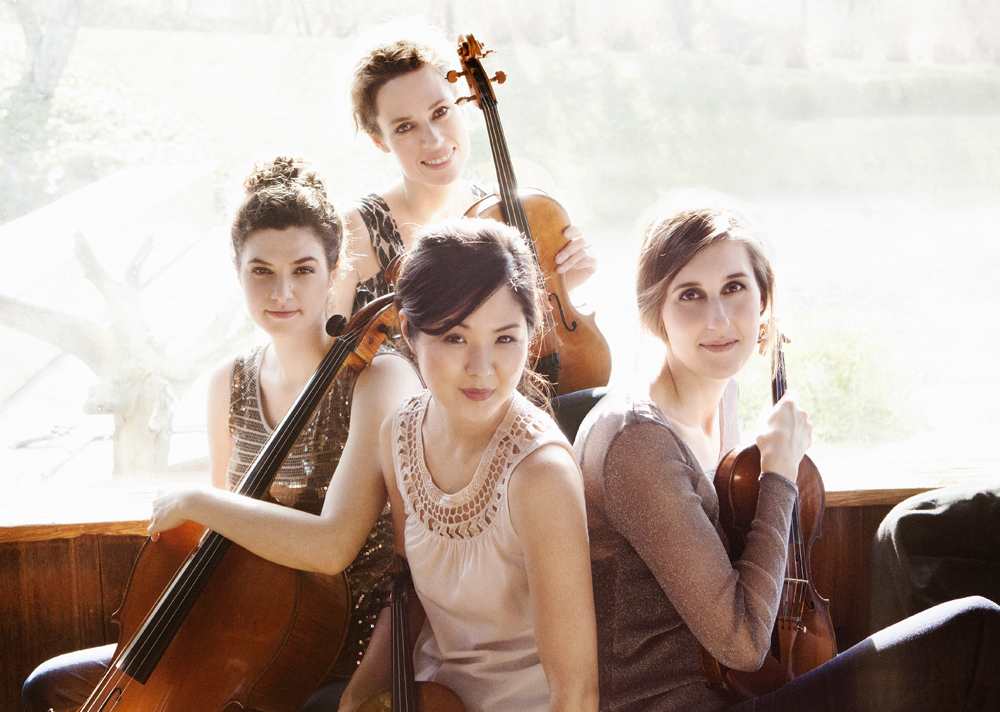Cecilia Quartet marks the Stradivari anniversary at Library of Congress

The Cecilia Quartet performed Saturday night at the Library of Congress. Photo: Lisa-Marie Mazzucco
Among the magnificent holdings of the Library of Congress are a number of precious historical instruments. At the top of the list are string instruments by Antonio Stradivari, the legendary luthier from Cremona. The Library of Congress’s free concert series includes a tribute to him every year, on or near the anniversary of his death, December 18, 1737, for which a string quartet is handed the Strads of their choosing to perform a concert.
This year the Cecilia String Quartet did the honors, at a performance heard on Saturday night. This all-women string quartet from Canada, formed in 2004 and named in honor of music’s patron saint, won the Banff International String Quartet Competition in 2010. In addition to that First Prize, the group took the top prize for a performance of the new work commissioned for the competition, Ana Sokolović’s Commedia dell’Arte. No surprise, then, that they also excelled in the two most contemporary works on this concert.
Sofia Gubaidulina’s First String Quartet began with the viola on G sharp, which each musician took up in turn, coaxing it into a trill, clouding it with semitones and microtones.
That was the last moment of unity in the work, as the four musicians drifted further apart, both literally and musically. Gubaidulina isolates the four parts into different senses of meter, a splintering echoed by the musicians sliding their chairs and stands backward, beginning with the cellist. It is a John Cage-inspired gimmick, which drew a few laughs from bemused audience members as the four players gradually retreated to the four corners of the stage, each in their own musical world. Take the trick away, however, and you would be left with a fairly sparse musical texture and lots of barren solos that did not hold attention for long.
The foursome had better results with Tantric Variations, a work commissioned by the Cecilia Quartet from Canadian composer Kati Agócs and premiered earlier this year. It opened with a baffling croaking sound from all four players, a technique the composer calls a pitchless slow bow. Agócs adroitly drew on a much greater variety of sounds and textures than found in the Gubaidulina piece, and the group brought all of it to life with admirable dedication.
In addition to a folk music-like main theme that runs through the work, stinging Bartók pizzicati enlivened a rhythmically charged dance section, and first violinist Min-Jeong Koh took flight on a soaring solo accompanied by restless repeated notes. The violinists later slashed at a sweet closing serenade in the viola and cello with shrieking dissonances. As this more tonal music seemed to win out, Agócs sent the second violinist high over her comrades, a challenge Sarah Nematallah met with grace.
Two earlier quartets received beautiful, capable performances but did not seem to sit as easily in the group’s comfort zone. Mendelssohn’s Quartet in E Minor is on the Cecilia Quartet’s successful new disc of the composer’s quartets. The group approached the score with restraint, creating a romantic air of restlessness in this music, which does not sit still for long, making the more passionate climaxes in the first movement more mordant.
The Scherzo was charmingly fluid, the engine propelled by the driving repeated-note motif played crisply. The third movement, taken at a more relaxed tempo, was just as lovely, although here as elsewhere violist Caitlin Boyle was much less audible than her colleagues. Hard to say if this reticence was due to the experience of playing on Stradivari’s 1727 “Cassavetti” viola, but it was noticeable in all of the pieces. The finale was all action, muscled through impressively at an exciting pace.
Least satisfying was Mozart’s Quartet in D Minor, K. 421. Set at moderate tempi in all four movements, the score tends to reward the sort of restraint the group applied to the Mendelssohn quartet on the program. The Cecilia Quartet instead went for big contrasts, dramatic accents, and exaggerated crescendi, not to mention pushing forward the tempi in an unsettling way.
In both the Mendelssohn and here, first violinist Min-Jeong Koh rushed ahead of the beat at times, disturbing the serenity of the second movement, for example. Both the third and fourth movement were similarly strained, just enough, that what could have been a superlative performance was merely good. The exception was the trio of the third movement, where the first violinist held back a bit in tempo and dynamics, as the others accompanied in delicate pizzicati. There the music popped off the page.
The next concert at the Library of Congress features harpsichordist Richard Egarr 8 p.m. January 13. Admission is free. loc.gov/concerts.
